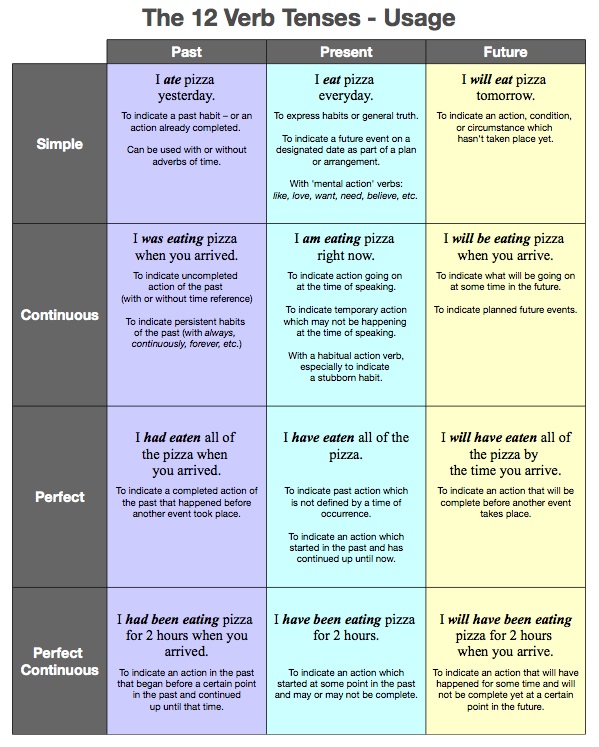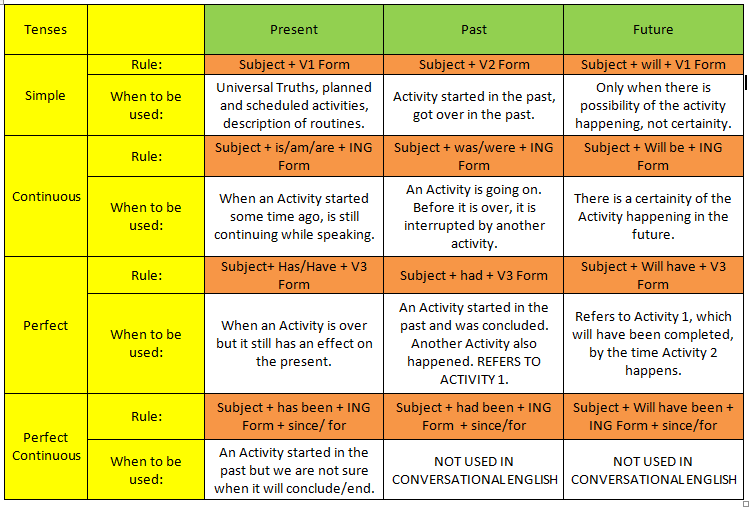12 Tenses Of English Grammar
All 12 Verb Tenses in English – Past, Present and Future Verbs
Feb 28, 2018 - ENGLISH TENSES – 12 TENSE REVIEW. Leave a reply. We have collected our three favourite online tables to explain the tricky grammar!
- Learning the 12 verb English tenses with pictures and examples of how to use them in a sentence. Download the 12 English tenses in English grammar in PDF Slideshare uses cookies to improve functionality and performance, and to provide you with relevant advertising.
- Below is a series of 40 basic English grammar lessons covering most of the English grammar tenses and most-used structures. All the lessons are designed with clear definition, explanation, form followed by lots of examples.
Do you want to improve your English verb tense skills?
A good place to start is this list of all 12 verb tenses where we give the verb conjugation for the verb “to travel”.
From past, present and future, here are practical examples with different subjects.
Take a look at these 12 types of verb conjugation:
Present Simple Verb Tense
When you use present simple, you are using a routine. It’s something that you always do every day, month or year. Or it’s something that you never do.
PRESENT VERB TENSE EXAMPLES:
- I, You, We, They: travel every day.
- He, She, It: travels every day.
Present Continuous/Progressive Verb Tense
When you use present continuous, you are referring to what is happening right now. Also, it can be an action that is not yet complete.
PRESENT CONTINUOUS/PROGRESSIVE EXAMPLES:
- I: am traveling right now.
- You, We, They: are traveling right now.
- He, She, It: is traveling right now.
Present Perfect Verb Tense
Although it’s easy to confuse this verb tense with present simple, the main difference is that the action is complete for present perfect. In other words, you are looking at the result right now without any words referring to time.
Activate driver easy registration key. With Drivereasy professional license key you don’t need need to search for hours on the internet for finding your computer hardware drivers. The software that we provided in this article allows you to detect and install the latest version of drivers in the shortest time.
PRESENT PERFECT EXAMPLES:
- I, You, We, They: have traveled to France.
- He, She, It: has traveled to France.
Present Perfect Continuous/Progressive Verb Tense
In this verb tense, an action starts in the past but it’s still continuing now. You have been performing the action and still are performing the action in the present.
PRESENT PERFECT CONTINUOUS/PROGRESSIVE EXAMPLES:
- I, You, We, They: have been traveling for a day.
- He, She, It: has been traveling for a day.
Past Simple Verb Tense
For past simple, it includes a finished action and time.
PAST SIMPLE EXAMPLES:
- I, You, We, They, He, She, It: traveled to France yesterday.
Past Continuous/Progressive Verb Tense
When you use past continuous, you are often using two actions. However, one action is not finished in the past, and another is complete interrupting the other action.
PAST CONTINUOUS/PROGRESSIVE EXAMPLES:
- I, He, She, It: was traveling by bus when the deer crossed the road.
- You, We, They: were traveling when the deer crossed the road.
Past Perfect Verb Tense
This verb tense uses two actions at two different times. Before the second action occurs, the first action is complete.
PAST PERFECT EXAMPLES:
- I, You, We, They, He, She, It: had traveled by car when the bus arrived.
Past Perfect Continuous/Progressive Verb Tense
For colloquial English, we don’t use past perfect continuous very often. But in text books, it’s a bit more common. This very tense has a complete action that happened before a second action. But in this case, you can describe how long.
PAST PERFECT CONTINUOUS/PROGRESSIVE EXAMPLES:
- I, You, We, They, He, She, It: had been traveling for one hour when the car broke down.
Future Simple Verb Tense
This verb tense is about planning things to do in the future. For example, what will you do tomorrow or next week?
Instead of using “will”, you can use “going to” for future tense. But this lesson uses “will” for the future tense.
FUTURE SIMPLE EXAMPLES:
- I, You, We, They, He, She, It: will travel to France tomorrow.
Future Continuous/Progressive Verb Tense
The action is not complete, when another action happens in the future. This is similar to past continuous, but it refers to the future.
FUTURE CONTINUOUS/PROGRESSIVE EXAMPLES:
- I, You, We, They, He, She, It: will be traveling when you arrive.
Future Perfect Verb Tense
An action will be completed in the future before another is completed.
FUTURE PERFECT EXAMPLES:

- I, You, We, They, He, She, It: will have traveled to France by the time you arrive.
Future Perfect Continuous/Progressive Verb Tense
An action will be continuing in the future when it is interrupted by another action. In this future verb tense, it often includes an indication of how long the action has been happening.
FUTURE PERFECT CONTINUOUS/PROGRESSIVE EXAMPLES:
Types Of Tenses With Examples

12 Tenses Of English Grammar With Examples
- I, You, We, They, He, She, It: will have been traveling for one hour when you arrive.